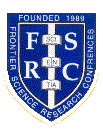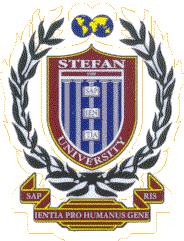|
Frontier Science Research Conferences--F S R C
Promote and Diffuse |
|
F S R C USA
|
F |
|||||||||||||||||||||||
|
Stefan University Press Series on
|
||||||||||||||||||||||||||
|
|
La Jolla International
School of Science La Jolla, CA 92038-2946 |
 |
||||||||||||||||||||||||
|
NEW IDEAS in TOKAMAK CONFINEMENT
Reviewed by NEW IDEAS IN TOKAMAK CONFINEMENT The book is an outgrowth of the International Topical Conferences on Research Trends in Physics, New Ideas in Tomakak Confinement, held at La Valencia Hotel, La Jolla, California, 27-29 January 1992. Published in the Research Trends in Physics Series of the La Jolla International School of Physics, The Institute for Advanced Physics Studies, La Jolla, California (American Institute of Physics, New York, 1994 (M.N. Rosenbluth, Editor-in-Chief), 483 pages, ISBN 1-56396-131-8, price: US $85, APS Members US $68). The tokamak has been by far the most successful magnetic confinement concept for the realization of fusion conditions. Already, significant amounts of fusion power have been produced for periods of the order of a second from deuterium-tritium (DT) plasma in a tokamak. Extrapolations from today's experimental results to the requirements for achieving ignited burn, for example, in the International Thermonuclear Experimental Reactor (ITER), can be made with justifiable confidence. At the same time, recent conceptual studies of DT tokamak reactors have indicated that substantial improvements in conventional tokamaks will be needed before a fusion power plant based on the tokamak will be commercially attractive. Moreover, the tokamak would seem to suffer from too low a plasma beta value to make it suitable for an advanced fuel fusion reactor. This book provides a valuable perspective, circa early 1992, on ideas for improving the tokamak. It is one of the La Jolla International School of Physics' Research Trends in Physics Series (V. Stefan, Series Editor), a forum for the publication of edited topical books within key fields of physics. The book contains 23 papers presented by invited participants at an international topical conference organized by the La Jolla International School of Physics and sponsored by the American Physical Society. The papers are arranged into four topics, as follows: (a) New confinement systems, (b) Energetic particle confinement and stability, (c) Tokamak turbulence and transport, (d) New perspectives on confinement. The papers are generally of high quality and are written by leaders in the relevant fields. Some papers propose substantial changes in the tokamak's geometric configuration. R.J. Goldston shows how a very strongly shaped plasma with a relatively large aspect ratio can provide a steady state advanced tokamak with a large self-generated bootstrap current. Several authors, including V.E. Golant, B.B. Kadomtsev, S. Lebedev and co-workers, discuss the high beta values theoretically obtainable in very small aspect ratio tokamaks and their possible application to advanced fuel (D-3He) tokamak reactors. P.H. Rebut defends the more conventional tokamak, as embodied in ITER, but focuses on the particular difficulty of the divertor. A number of advanced regimes with reduced cross-field transport have been discovered in tokamak experiments, and theory is increasingly successful in identifying the key physical ingredients. Excellent papers by P.W. Terry, B.A. Carreras, P.N. Gudzar and A.B. Hassam and co-workers, emphasize radial shear in the plasma rotation velocity as a a critical element in reducing turbulence and cross-field transport. The promising new technique of gyro-fluid simulation is described by G.W. Hammett. Novel ideas on cross-field transport are also presented by B. Coppi, C.C. Hegna and co-workers; the impact of various confinement scalings on ITER is carefully documented by F.W. Perkins. Although empirical scalings may prove reliable in predicting the confinement in an ignited tokamak, the presence of an intense population of energetic alpha particles introduces new possibilities for microinstability, especially in the Alfven wave branch of the spectrum. This area of active theoretical research is ably covered in papers by H.J. Berk and F.Y. Gang. The papers have been reproduced from camera ready copy supplied by the contributors, but they appear to have been prepared carefully; the text and the accompanying figures are attractively presented in the book. Paul H. Rutheford Princeton Plasma Physics Laboratory, Princeton, New Jersey, United States of America This is a forum for the publication of edited topical books within key fields of physics. Volumes in the series are based largely on invited symposia organized by the La Jolla International School of Physics, a division of the Institute for advanced Physics Studies, La Jolla, California. These small, select meetings bring together prominent researchers from around the world to discuss critical issues, critique a field's present status, and point the way toward new avenues in research. Some volumes are based on a selection of topics and contributors made by appointed
editor(s), e.g., Nonlinear Acoustics. further, some volumes are dedicated solely to the research in one country; e.g., Nonlinear and Relativistic Effects in Plasmas dealing with research in the U.S.A. and Nonlinear Acoustics covering research in the
Former Soviet Union. Contributors in the series -- all whom appear by invitation are asked to go beyond the narrow particulars of their work and to reflect on larger questions, problems, and trends. The resulting volumes will document the latest thinking regarding the current and future states of physics research for the international physics community. LIBRARY
of CONGRESS ONLINE CATALOG Stefan
University Press Series on Stefan
University Press Series on Stefan
University Press Series on Stefan University Press Series on RESEARCH TRENDS in PHYSICS (AMAZON.COM) The List is Incomplete
|
( C ) La
Jolla International School of Science This Entire La Jolla, CA 92038-2946 A PRIVATE UNIVERSITY FOR EXCELLENCE IN EDUCATION AND RESEARCH WORLDWIDE |
|||||||||||||||||||||||||


